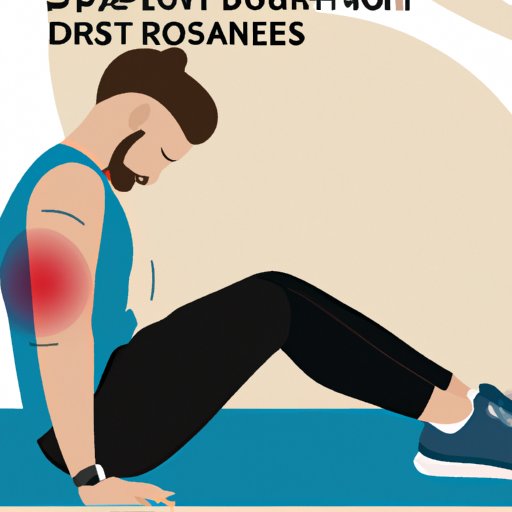Introduction
It’s not uncommon to experience some level of soreness after a workout. But is it normal to be sore after exercising? Can it be beneficial? In this article, we’ll explore what to expect from a good workout, why you may feel sore after exercise, and how to manage post-workout pain.
Overview of Post-Workout Soreness
Post-workout soreness, or delayed onset muscle soreness (DOMS), is a common experience for those who engage in physical activity. It’s characterized by aching, stiffness, and discomfort in the muscles, which typically appears 12-24 hours after exercise.
DOMS is believed to be caused by microscopic tears in the muscle fibers that occur during exercise. These tears are part of the body’s natural healing process, and they can lead to increased strength and improved performance over time.
Benefits of Post-Workout Soreness
There are several potential benefits associated with post-workout soreness. For example, when the body experiences DOMS, it releases endorphins, which are hormones that act as the body’s natural painkillers. Endorphins can help reduce stress and improve mood.
Additionally, post-workout soreness can indicate that a person is challenging their body in new ways and making progress toward their fitness goals. This can be a source of motivation and encourage them to push themselves further.

What to Expect from a Good Workout: Understanding Soreness
When it comes to understanding post-workout soreness, there are a few key terms to keep in mind. Delayed onset muscle soreness (DOMS) is the most common type of post-workout soreness. It occurs 12-24 hours after exercise and is usually felt in the muscles that were used during the workout.
In addition to DOMS, other types of post-workout soreness include acute muscle soreness, which occurs immediately after exercise, and chronic muscle soreness, which is persistent soreness that lasts more than two weeks.
Is It Normal to Feel Sore After Exercise?
The answer to this question really depends on the individual. Everyone’s body responds differently to exercise, and some people may experience more soreness than others. Some level of soreness is normal, and it can even be beneficial.
Understanding Your Body’s Response to Exercise
It’s important to remember that your body needs time to adjust to a new exercise routine. When you first start working out, your body may be unfamiliar with the movements, and this can lead to soreness. As you continue to exercise, your body will become accustomed to the routine and the soreness should subside.
Looking at the Pros and Cons of Post-Workout Soreness
Post-workout soreness can be beneficial in some ways, but it can also be detrimental if it’s too severe. On the plus side, soreness indicates that your muscles are being challenged and that you’re making progress toward your fitness goals. On the downside, excessive soreness can impede your ability to perform well in subsequent workouts.
How to Manage Soreness After a Workout
If you’re experiencing post-workout soreness, there are a few things you can do to minimize the discomfort. First, make sure to get plenty of rest between workouts. Additionally, consider using an ice pack or taking a hot bath to reduce inflammation and promote healing.
You can also try stretching or foam rolling after a workout to reduce tightness in your muscles. Finally, make sure to eat plenty of protein and complex carbohydrates to give your body the fuel it needs to repair itself.
What Does Muscle Soreness Tell You About Your Workouts?
Post-workout soreness can tell you a lot about your workouts. If you’re consistently feeling sore after exercising, it could mean that you’re pushing yourself too hard. On the other hand, if you don’t feel any soreness, it could mean that you’re not challenging yourself enough.
By paying attention to your body’s response to exercise, you can learn more about your limits and modify your workouts accordingly. This can help you optimize your performance and get the most out of your workouts.
The Science Behind Post-Workout Soreness
The exact cause of post-workout soreness is not fully understood, but scientists believe that it’s related to the body’s inflammatory response. When muscles are subjected to intense exercise, they become inflamed, which can lead to discomfort.
In addition, researchers have identified a number of biochemical changes that occur in the body after exercise, including the release of hormones and enzymes that can contribute to muscle soreness.
Is It Healthy to Feel Sore After Working Out?
When it comes to post-workout soreness, there are pros and cons. On the one hand, it can be beneficial in terms of motivating you to keep pushing yourself and improving your performance. On the other hand, excessive soreness can be detrimental to your progress.
Ultimately, it’s important to listen to your body and pay attention to how it responds to exercise. If you find that you’re consistently feeling sore after workouts, take a step back and adjust your routine. And if you’re not feeling any soreness, it may be a sign that you need to challenge yourself more.
Conclusion
Post-workout soreness is a common experience for those who engage in physical activity. While some level of soreness is normal, it’s important to understand the risks and benefits associated with DOMS. By listening to your body and adjusting your workout routine accordingly, you can ensure that you’re getting the most out of your workouts.
So, is it normal to be sore after working out? The answer is yes—but it’s important to monitor your body’s response and adjust your routine accordingly.
(Note: Is this article not meeting your expectations? Do you have knowledge or insights to share? Unlock new opportunities and expand your reach by joining our authors team. Click Registration to join us and share your expertise with our readers.)
